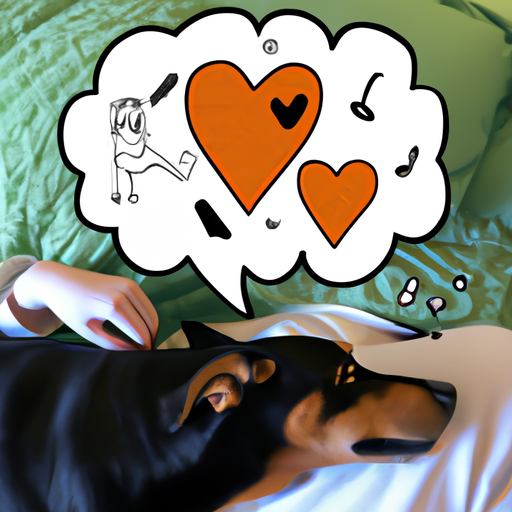Introduction to Canine Behavior
As a caregiver, understanding your dog’s behavior is crucial to foster a strong bond and ensure their well-being. One behavior that is often puzzling is when dogs lay on their owners. This could be while you’re sitting on the couch or in bed. But what does it mean when your dog lays on you? This article will delve into the reasons behind this behavior, offering you greater insight into your furry friend.
1. Seeking Comfort and Warmth
Dogs are pack animals, meaning they thrive in the company of their family. When your dog lays on you, it could be a sign of them seeking comfort and warmth from you – their favorite pack member.
You provide a sense of security and warmth that they crave. This is especially true during colder months when they may be looking for a cozy spot to lay down.
Consider this as their way of getting a warm, comforting hug. It’s an intimate way for them to say, “I love you and trust you deeply.”
2. Asserting Dominance
In some cases, when a dog lays on you, it may be a display of dominance. This is often the case if the behavior is accompanied by other dominant behaviors such as:
- Barking or growling when you try to move them
- Refusing to move when you ask them to
- Laying on you without any invitation or encouragement
If you notice these signs, it’s crucial to address this behavior appropriately. Remember, you’re the pack leader, not them. Make it a point to train them to lay on you only when invited.
3. They’re Feeling Anxious
Dogs experience anxiety just like humans do. They might lay on you as a coping mechanism when they’re feeling nervous or scared. This could be due to a thunderstorm, fireworks, or even separation anxiety.
Your presence can bring them comfort and calm their nerves. It’s a clear sign of trust – they see you as their protector.
4. Marking Territory
Dogs have a keen sense of smell. When your dog lays on you, they’re also leaving their scent on you. This is their way of marking their territory, signaling other dogs that you’re their human.
While this might seem like a dominant behavior, it’s more often a sign of affection and bonding. They’re essentially telling the world, “This is my human, and we belong together.”
5. They Want Attention
Sometimes, the simplest explanation is the right one. Your dog might just be laying on you because they want your attention. This is especially true if they lay on you when you’re busy with something else, like watching TV or working on your laptop.
If this is the case, they’ll likely look at you expectantly, wag their tail, or even paw at you. It’s their way of saying, “Hey, I’m here! Let’s play or cuddle.”
Frequently Asked Questions
1. Is it bad if my dog lays on me?
Not necessarily. It largely depends on the reason behind the behavior. If it’s a sign of affection, comfort-seeking, or even mild anxiety, it’s entirely normal and can foster bonding. However, if it’s a display of dominance, it’s essential to address it appropriately to maintain your role as the pack leader.
2. What should I do if my dog is laying on me due to anxiety?
Try to identify the source of their anxiety and address it if possible. Offer them comfort and reassurance. In severe cases, it may be beneficial to seek advice from a veterinarian or a professional dog behaviorist.
3. How can I discourage my dog from laying on me?
Training is key. You can train your dog to lay on their own bed or a designated spot in your home. Be consistent and patient. Remember to reward them for following commands correctly.
4. Is my dog laying on me a sign of health issues?
While it’s usually a normal behavior, drastic changes in your dog’s behavior can sometimes indicate health problems. If your dog suddenly starts laying on you more frequently or if the behavior is accompanied by other concerning signs, it might be a good idea to consult a vet.
Remember, understanding your dog’s behavior is key to your relationship. So the next time your dog lays on you, you’ll know they’re not just seeking a cozy spot, but expressing their affection, trust, and even their need for comfort. It’s just one of the many ways they say “I love you.”



